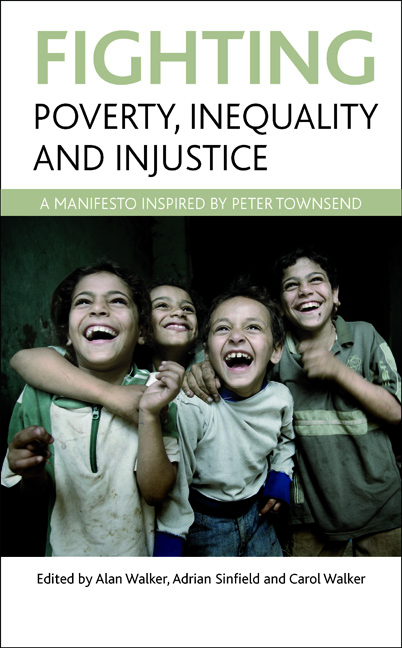Book contents
- Frontmatter
- Dedication
- Contents
- List of figures and tables
- Preface
- Notes on contributors
- one The legacy of Peter Townsend
- two The making of a pioneer researcher: reflections from Peter Townsend’s life story
- three Peter Townsend, a man ahead of his time: re-reading The family life of old people and The last refuge
- four The case for universal child benefit
- five Poverty
- six Social justice for children: investigating and eradicating child poverty
- seven For universalism and against the means test
- eight Underclass, overclass, ruling class, supernova class
- nine Addressing health inequalities: building on Peter Townsend’s legacy
- ten Towards a new sociology of ageing: from structured dependency to critical gerontology
- eleven Disability: prospects for social inclusion
- twelve Putting the lawyers in their place: the role of human rights in the struggle against poverty
- thirteen Radicalising social policy in the 21st century: a global approach
- fourteen Conclusion: building on the legacy of Peter Townsend
- Index
twelve - Putting the lawyers in their place: the role of human rights in the struggle against poverty
Published online by Cambridge University Press: 01 September 2022
- Frontmatter
- Dedication
- Contents
- List of figures and tables
- Preface
- Notes on contributors
- one The legacy of Peter Townsend
- two The making of a pioneer researcher: reflections from Peter Townsend’s life story
- three Peter Townsend, a man ahead of his time: re-reading The family life of old people and The last refuge
- four The case for universal child benefit
- five Poverty
- six Social justice for children: investigating and eradicating child poverty
- seven For universalism and against the means test
- eight Underclass, overclass, ruling class, supernova class
- nine Addressing health inequalities: building on Peter Townsend’s legacy
- ten Towards a new sociology of ageing: from structured dependency to critical gerontology
- eleven Disability: prospects for social inclusion
- twelve Putting the lawyers in their place: the role of human rights in the struggle against poverty
- thirteen Radicalising social policy in the 21st century: a global approach
- fourteen Conclusion: building on the legacy of Peter Townsend
- Index
Summary
Introduction
Peter Townsend came to ‘human rights’ as a term late in his career, but its spirit had been with him from the start. As early as 1958, in his contribution to the well-known Conviction volume, Peter was writing like a human rights activist:
If that overdone phrase ‘a classless society’ means anything it is a society where differences in reward are much narrower than in Britain today and where people of different backgrounds and accomplishment can mix easily and without guilt; but also a society where a respect for people is valued most of all, for that brings a real equality. (Townsend, 1958, pp 93, 120)
With his wife Jean Corston as Chair of the newly established Joint Committee on Human Rights, there was no shortage of energetic human rights support in the Townsend household in the first decade of the 21st century. Here was an ideal way for Peter to carry on his battles against poverty at a time when the traditional socialist ethic seemed so much in eclipse and when (as a result of such decline) progressive language of any sort was very hard to find. His support for me as the incoming Director of the London School of Economics and Political Sciences’ (LSE) Centre for the Study of Human Rights was immense: helping me navigate the perils of a new university environment on my arrival in 2002; securing Mary Robinson to give the lecture to launch my directorship (and packing out the Peacock Theatre as a result); chairing the Centre's advisory board for the first five years of my tenure as director; throwing himself into all our activities (I particularly remember him holding forth as Mahatma Gandhi in front of 450 enthralled students to win a Centre debate over who was the greatest human rights person of the 20th century – beating Eleanor Roosevelt, Nelson Mandela and many other distinguished activist icons in the process); and teaching a hugely popular course on children's rights which drew admiring attendees from across LSE's entire spectrum of postgraduate students. One meeting among many stands out: early in my tenure and at the height of New Labour's popularity, I brought a colleague from my barristers’ chambers (and LSE governor) Cherie Booth together with Peter to talk about poverty and how to reduce it: for two engrossing hours in my office Peter sought to persuade her that government could do more, and Cherie tried as best she could to explain why what her husband Tony Blair had already done – slight though it seemed to Peter – was revolutionary by the standards of the international political culture in which, as Britain's Prime Minister, he was then moving.
- Type
- Chapter
- Information
- Fighting Poverty, Inequality and InjusticeA Manifesto Inspired by Peter Townsend, pp. 241 - 256Publisher: Bristol University PressPrint publication year: 2011



